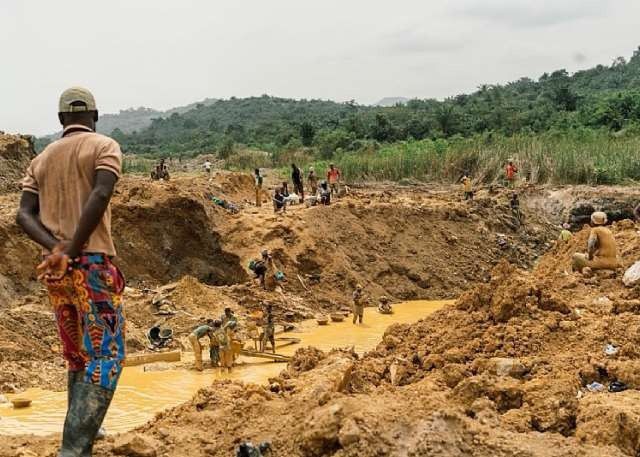#StopGalamseyNow: 8 misconceptions about illegal mining vs the realities
)
This article aims to debunk some of these misconceptions, shedding light on the complex realities surrounding galamsey and its broader implications for Ghana's future.
1. Illegal Mining Provides Long-Term Economic Benefits
- Misconception: Many believe that illegal mining generates long-term wealth for those involved, particularly for young people seeking quick financial gain.
- Reality: Although illegal mining may offer short-term financial benefits, it leads to long-term environmental degradation, health hazards, and the destruction of legitimate economic activities, such as farming. In the long run, this often exacerbates poverty in affected areas.
2. Illegal Mining is Only a Localised Issue
- Misconception: Illegal mining is often perceived as a localised issue, restricted to certain rural areas.
- Reality: The effects of illegal mining extend beyond local communities, affecting national water bodies, agricultural productivity, and environmental health. It has also garnered international attention due to concerns over environmental conservation and the involvement of foreign actors in illegal mining activities.
3. Only the Poor and Uneducated Engage in Illegal Mining
- Misconception: There is a belief that illegal mining is solely undertaken by the poor or uneducated.
- Reality: Illegal mining often involves individuals from a variety of socio-economic backgrounds, including those with some education. Moreover, some influential individuals or groups may be involved, benefiting from illegal mining while exploiting the local workforce.

4. Illegal Mining Does Not Cause Significant Environmental Harm
- Misconception: Some people think the environmental impact of illegal mining is exaggerated or easily reversible.
- Reality: Illegal mining results in severe environmental damage, including deforestation, the destruction of farmlands, river pollution, and soil degradation. Reversing this damage is both difficult and costly, often taking decades to restore ecosystems.
5. Legalising Mining Will Solve the Problem
- Misconception: Some argue that simply legalising all mining activities will resolve the issues associated with illegal mining.
- Reality: Legalising mining without proper regulation and enforcement may not address the problem. Illegal miners frequently evade regulations to maximise profits, and legalising mining without tackling corruption and ensuring oversight can lead to greater exploitation and environmental destruction.
6. The Government Alone Can Stop Illegal Mining
- Misconception: Many people believe that the government can single-handedly halt illegal mining by cracking down on operations.
- Reality: While government intervention is essential, a multi-faceted approach involving local communities, law enforcement, private companies, and NGOs is required to effectively address the issue. Local communities must be educated and empowered to protect their environments.
7. Illegal Miners Do Not Care About the Environment
- Misconception: There is a perception that illegal miners are fully aware of, and indifferent to, the environmental damage they cause.
- Reality: In many cases, illegal miners are unaware of the full extent of the environmental harm, or they may feel trapped in a cycle of poverty, prioritising immediate financial survival over long-term environmental concerns.
8. Galamsey Only Affects Small Villages and Communities
- Misconception: The damage caused by illegal mining is often thought to be confined to rural or remote areas.
- Reality: Illegal mining has a nationwide impact, particularly through the pollution of water sources such as the Pra and Ankobra rivers, which supply major cities. The loss of arable land due to mining also affects food production and the national economy.
Understanding these misconceptions helps provide a more comprehensive and realistic perspective on the issue of illegal mining, especially when discussing it in political or social settings.

)
)
)
)
)
)
)
)
)
)
,fit(112:112))
)
,fit(112:112))
)
)
,fit(112:112))